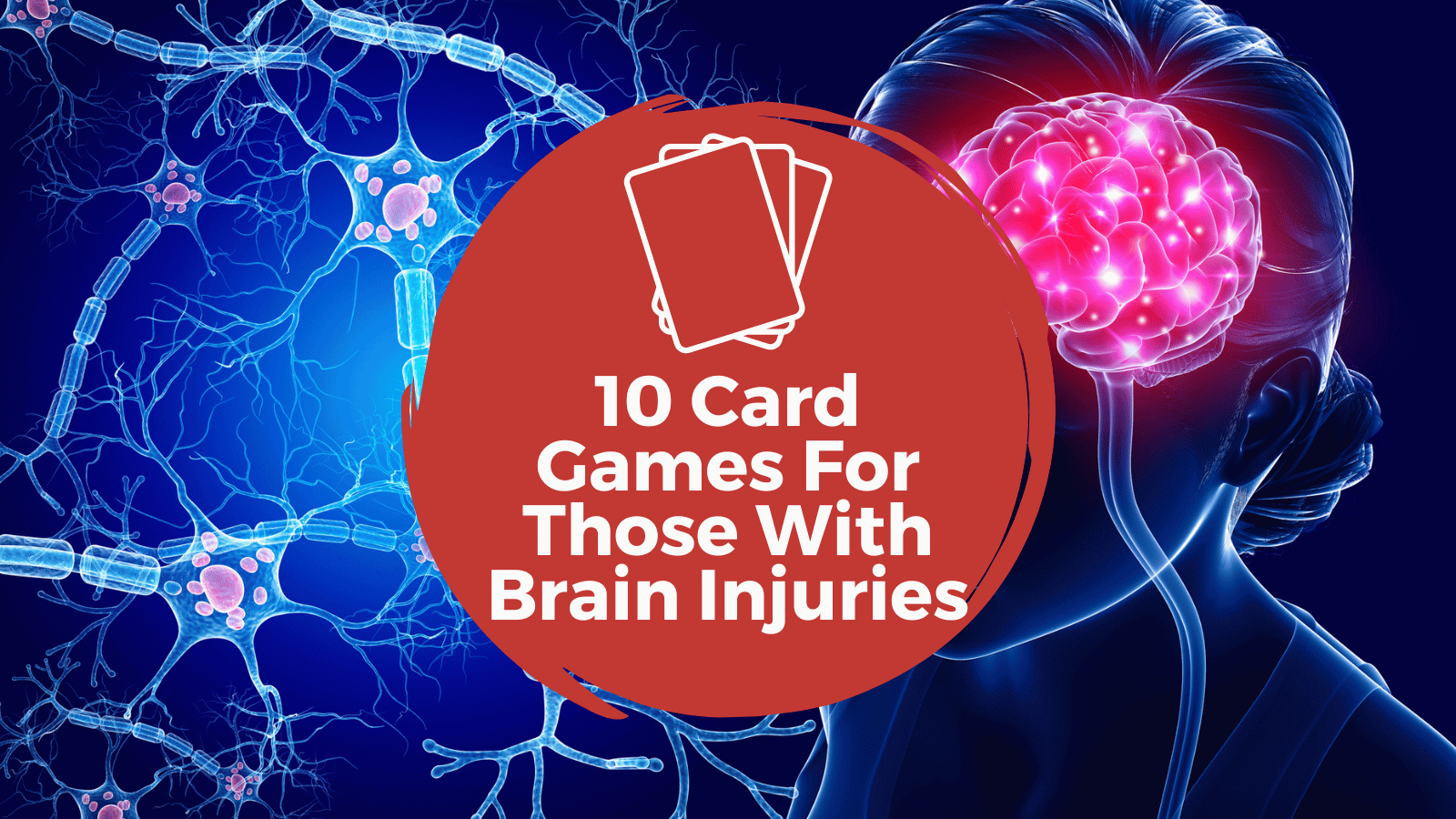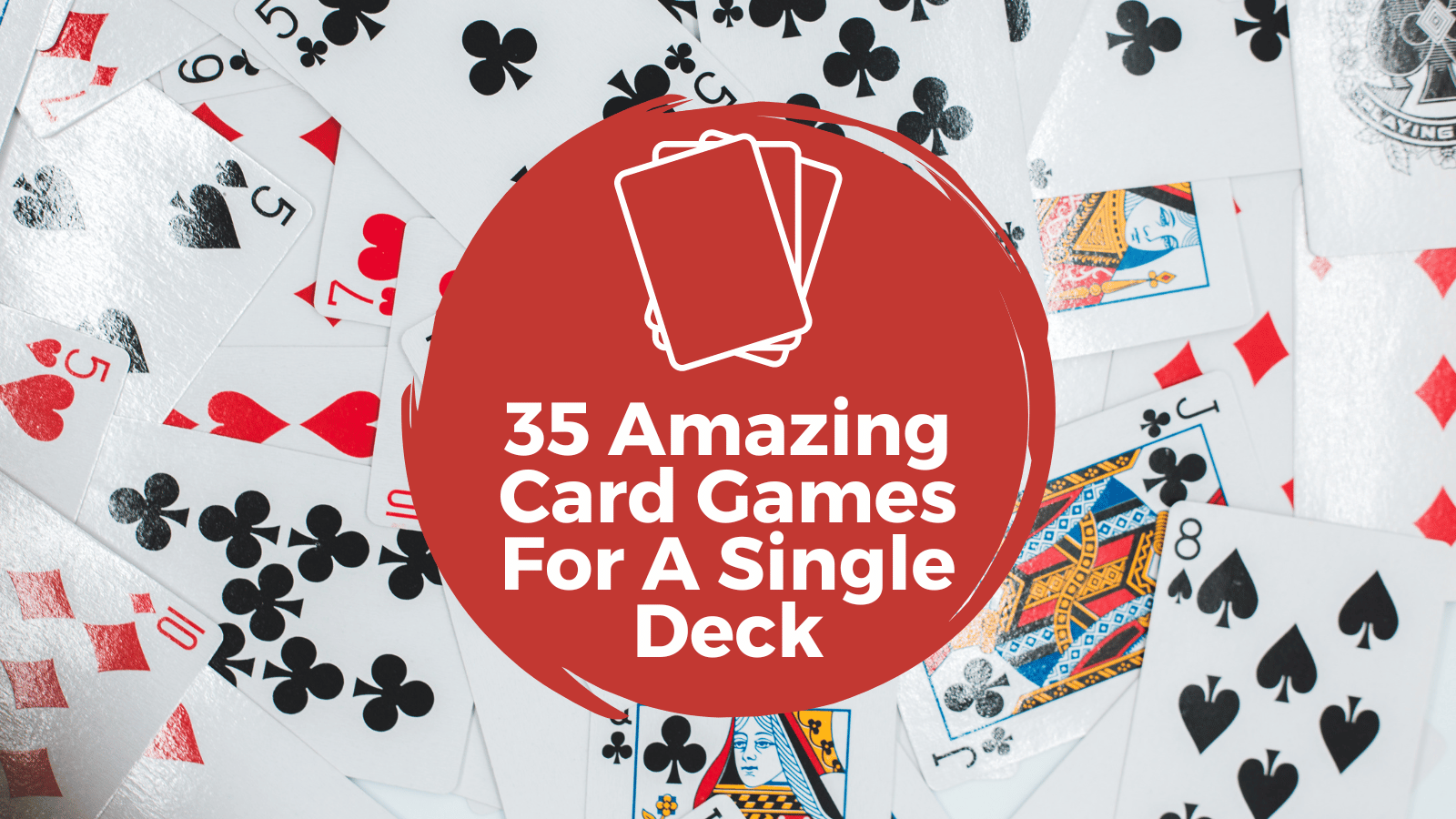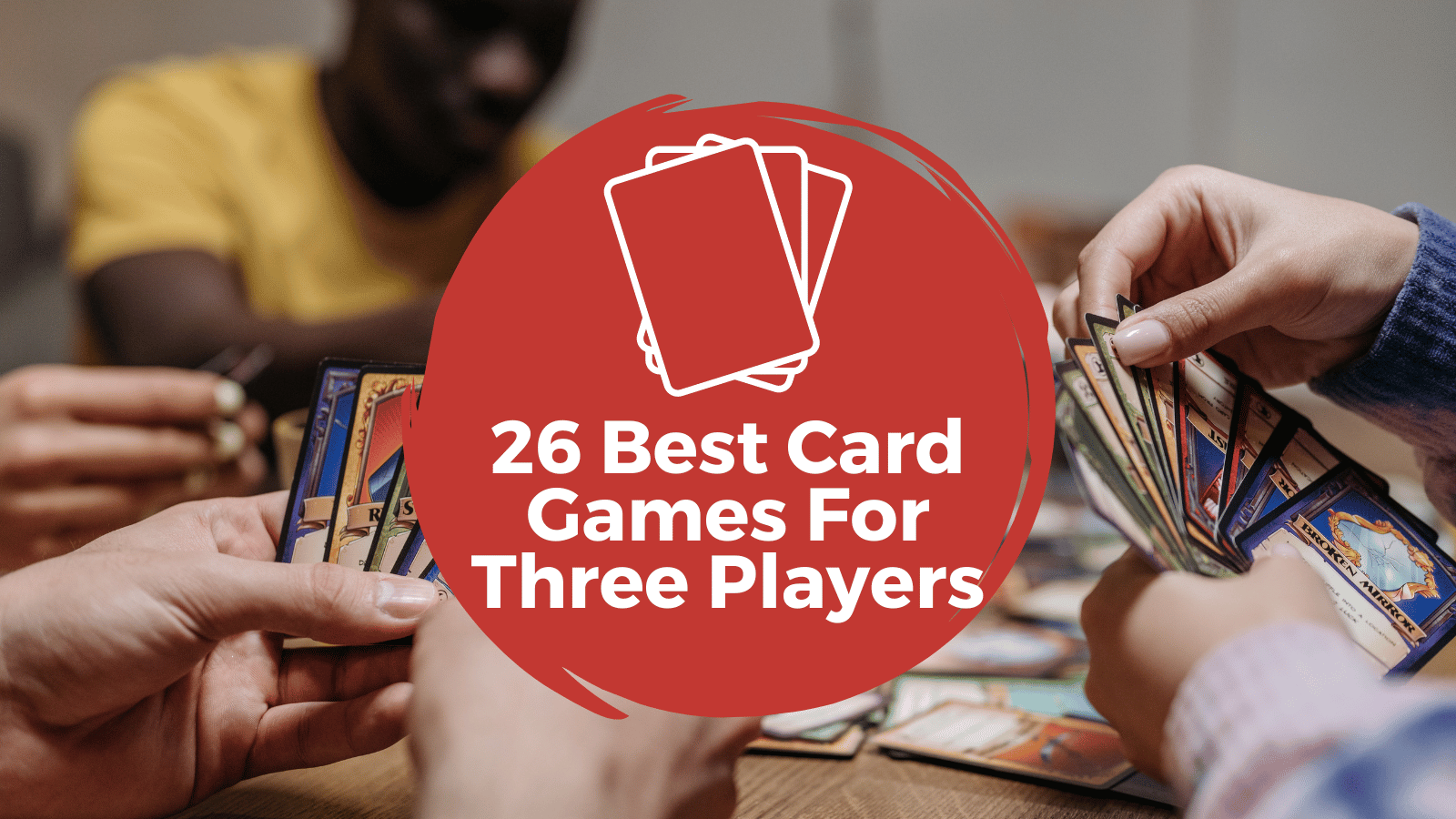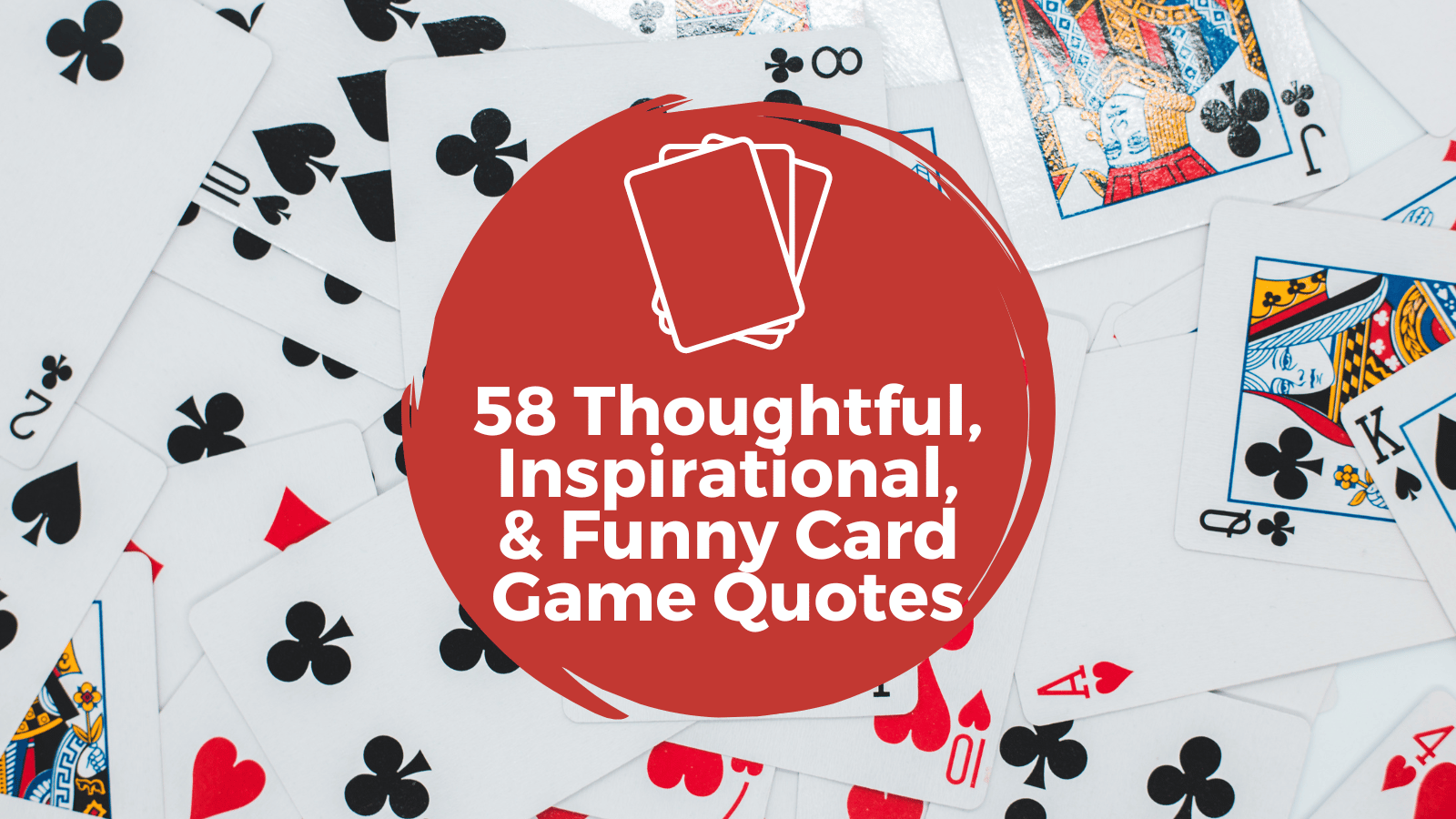A brain injury is a serious matter, and if you’re fortunate enough to be on the road to recovery (or know someone who is), it can be a long and tough time.
Fortunately, there are some small things we can do to help each and ourselves heal by stretching our minds, coordination, and social interaction. Card games fit right into this slot!
Of course, make sure you always speak with your or your person’s doctor before pushing into card games, but in many cases, it won’t hurt to play them. It may even help!
With this in mind, I decided to share some of the best card games for people with a brain injury to help them on the road to recovery!

Are you looking for some new games to spice up your life without spending a ton of money?
Enter the One Deck, Endless Fun eBook.
It contains 15 of my favorite card games you can play with a single deck of cards and a brief description of how to play each one.
I also include a handy table, breaking down each game in terms of difficulty, number of players, and the time it takes to play.
Table of Contents
10 Best Card Games Beneficial for People with Brain Injuries
Uno
Overview and basic rules: Uno is a matching game where players aim to discard all their cards by matching color or number. The first one to do so wins!
Benefits for individuals with brain injuries: Great for improving color and number recognition, it enhances decision-making skills too.
Go Fish
Overview and basic rules: Players try to collect sets of four cards by asking others for specific cards.
Benefits for individuals with brain injuries: Helps improve memory and social interaction skills.
Snap
Overview and basic rules: Players take turns placing a card face-up, and when two cards match, the first to say “snap” wins them.
Benefits for individuals with brain injuries: Boosts reflexes and enhances visual perception skills.
Memory/Concentration
Overview and basic rules: Players turn over two cards each turn, aiming to find matching pairs.
Benefits for individuals with brain injuries: Greatly aids in improving memory and concentration.
Memory is another type of card games that’s also good for babies. Check out the link for our full list!
Old Maid
Overview and basic rules: Players aim to avoid being the one holding the “Old Maid” when all pairs have been collected.
Benefits for individuals with brain injuries: Helps improve memory and strategic thinking.
War
Overview and basic rules: In War, each player flips a card; the player with the highest card wins both cards.
Benefits for individuals with brain injuries: Improves number recognition and comparative analysis skills.
Sequence
Overview and basic rules: Players aim to create a sequence of five chips on the game board by playing corresponding cards from their hand.
Benefits for individuals with brain injuries: Helps with pattern recognition and strategic planning.
Crazy Eights
Overview and basic rules: Players aim to discard all their cards by matching the suit or rank of the previously played card.
Benefits for individuals with brain injuries: Enhances decision-making and planning skills.
Rummy
Overview and basic rules: Players aim to form sets or runs of cards and lay them down. The player who first gets rid of all their cards wins.
Benefits for individuals with brain injuries: Aids in pattern recognition, memory, and strategic planning.
Solitaire
Overview and basic rules: A single-player game where the goal is to move all cards into foundation piles, sorted by suit and rank.
Benefits for individuals with brain injuries: Enhances pattern recognition, strategy, and decision-making skills.
The Significance of Card Games in Brain Injury Rehabilitation
The Cognitive Benefits of Card Games
Card games aren’t just about having fun—they can be a form of brain workout too.
Shuffling, dealing, and playing cards exercises both the mind and the body, stimulating cognitive functions in individuals recovering from brain injuries.
Remember the times you’ve tried to outsmart your opponents in a game of poker, or the strategies you’ve deployed to win at solitaire?
You were giving your brain a pretty good workout, you know.
Studies reveal that card games can improve various cognitive abilities.
One, they can sharpen memory. Remembering the cards played and strategizing based on those cards helps enhance short-term recall and working memory.
Two, they improve attention. Keeping track of what’s happening during a game requires both focus and concentration.
Three, card games enhance problem-solving skills and promote better decision-making. They demand players to think critically and plan their moves, which taps into our problem-solving abilities.
No matter how you slice it, the cognitive benefits of card games are a royal flush!
The Emotional and Social Benefits of Card Games
Let’s not overlook the emotional and social benefits of card games. A card game can bring a bright spot to an otherwise challenging day, fostering positivity and a sense of well-being.
The act of playing helps to reduce stress and anxiety, provides a sense of achievement when a game is won, and can help build resilience when it is lost. It’s a bit like life, don’t you think?
What’s more, card games can be a social affair. They’re a wonderful excuse to spend time with others, promoting social interaction and combatting feelings of loneliness or isolation.
While the individual is focusing on the game, they are also unconsciously practicing social skills—listening, taking turns, and practicing empathy and good sportsmanship. All of these can aid in their rehabilitation journey.
So, you see, card games aren’t just about a bit of fun. They’re an essential tool in the brain injury rehabilitation toolbox. They help heal not just the mind, but the heart as well.
Criteria for Choosing Suitable Card Games for Individuals with Brain Injuries
Before we delve into the world of cards, let’s equip ourselves with a checklist of sorts. How do we choose the right game for those with brain injuries? Keep these factors in mind:
Simplicity and Understandability
First things first, the game must be simple to understand.
Complex rules and intricate strategies might make a game intriguing for some, but it can cause undue stress for individuals with brain injuries. Choose games that are easy to learn and play.
Remember, we’re not aiming for the Poker World Series here.
We want games that feel like a gentle breeze, not a whirlwind. You should be able to explain the rules in a few short sentences. If you find yourself scribbling flowcharts or debating the finer points of the rulebook, it’s probably too complex.
Engagement and Fun Factor
Secondly, let’s not forget the golden rule – games should be fun! Engagement is key. If it’s not interesting, it’s not worth it.
Look for games with colorful cards, a touch of unpredictability, and maybe a dash of friendly competition. Who said rehabilitation couldn’t be enjoyable? Even the simplest games can spark laughter and create memorable moments.
Cognitive Stimulation and Memory Improvement
Thirdly, while we’re having all this fun, let’s not forget the end goal – aiding cognitive rehabilitation. Choose games that stimulate the brain and boost memory function.
Many card games, even simple ones, encourage strategic thinking, pattern recognition, and memory recall. They’re not just games; they’re gym workouts for the brain.
And like any good workout, they should leave you feeling energized, not exhausted.
Social Interaction Promotion
Last but not least, games should promote social interaction. They’re a great way to break the ice, stimulate conversation, and nurture bonds.
Playing games with others encourages communication, teamwork, and empathy. They allow for shared experiences, helping players feel connected and less isolated.
So, pick games that encourage interaction, not those that make players silently stare at their hands for ages.
Remember, folks, we’re here for a good time, and a long time. So, let’s choose the games that make rehabilitation a little less daunting, and a lot more fun.
How to Adapt Card Games for Different Levels of Ability
As the saying goes, “It’s all fun and games until someone feels left out.” But let me tell you, there’s no need for that. Yes, you heard it right.
You can adapt card games to suit different abilities, ensuring everyone at the table has a good time. It’s not about winning or losing, folks. It’s about the camaraderie, the light banter, and the shared moments of triumph and defeat. So, let’s dive in!
Simplifying Rules
We’ve all been there. You’re eager to play a game, and then WHAM! A rulebook thicker than grandma’s secret apple pie recipe. Well, fear not. You can simplify the rules. Start with the basic game mechanics and gradually add complexity as players become comfortable. Break the rules down into smaller, digestible parts. Write them down on cue cards or make a cheat-sheet.
Consider this. If you’re playing Uno, you can start with the simple mechanics of color and number matching, then slowly introduce action cards as players gain confidence. Remember, Rome wasn’t built in a day.
And your card game kingdom? It’s no different.
Implementing Aids and Supports
A little help never hurt anyone. I’m talking about aids and supports.
These can be physical or digital and can range from enlarged cards for those with visual impairments to card holders for individuals with dexterity challenges.
Did you know there are apps to help manage scores or even simulate a whole deck of cards? Handy, isn’t it?
You can also use colored markers or stickers to distinguish different suits or values in a deck. Get creative and make the game accessible to all.
Fostering a Patient, Supportive Environment
Now this one’s my favorite. A patient and supportive environment. Sounds warm and fuzzy, doesn’t it? It’s because it is.
Patience is key when learning a new game, especially for individuals with brain injuries. Encourage questions, no matter how many times they’ve been asked before.
Applaud efforts and celebrate small victories. This is not the World Poker Tour; it’s your friendly neighborhood game night.
Turn errors into teachable moments, not points of frustration. And remember, a little humor goes a long way.
Who shuffled this deck, a raccoon? Or, well, looks like I’ve got a hand only a mother could love!






